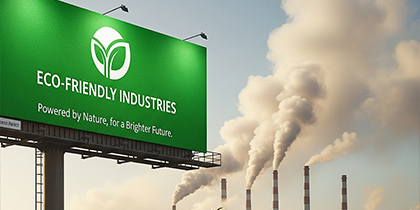Coca-Cola was in the news earlier this year for claiming that their (PET) bottles were made of 100% recycled material. Investigations by consumer organizations, revealed that this claim only applied to the bottle itself-not to the cap or label. This is a concrete example of Greenwashing: companies give the impression of being more sustainable than they really are.
This is more common than you think. Research shows that 58% of companies worldwide engage in Greenwashing. In North America, the figure is as high as 72%.
In this blog you will read what Greenwashing is, why it is important to recognize it and how to do so.
Why do companies engage in Greenwashing?
Half of consumers say they consider sustainability important, and almost a third regularly buy sustainable products. In addition, supply chain partners are increasingly setting sustainability as a condition-not only in consumer choices, but also in tenders and business collaborations.
In order to strengthen their competitive position, companies respond to this with (in many cases) actual sustainability, but also often with Greenwashing. Here, companies use misleading or exaggerated claims in their marketing.
Why is it important to recognize Greenwashing?
Suppose you are a reseller and you add a product to your assortment. The manufacturer claims it is a sustainable choice and you resell it to your customers with that same message. If it turns out afterwards that those claims were exaggerated or misleading, it can damage your reputation and credibility.
Greenwashing can also lead to companies that are serious about sustainability being unfairly questioned. Their efforts are taken less seriously because trust has been damaged by previous deception.
How can you recognize greenwashing?
A large majority of Dutch people (71%) feel that companies regularly engage in greenwashing. This is not surprising: more and more organizations are communicating about sustainability. But how can you recognize whether claims are reliable?
A small initiative does not say it all
A first signal of Greenwashing is when an organization highlights a small sustainable initiative and presents it as if its entire business is sustainable. Consider a clothing brand that introduces one collection of organic cotton and puts that down as proof of the entire organization.
Missing evidence
Claims without substantiation are also a concern. Missing information on concrete details such as the origin of materials, the proportion of recycled materials or independent labels-then there is a reason to be critical. Vague terms such as "eco," "green" or "natural" without further explanation are often also a signal of greenwashing.
Not sure if a label is reliable-or unreliable? Check the overview on this page.
What legislation is in place to combat Greenwashing?
Greenwashing is high on the European Union's agenda. For example, the EmpCo Directive was adopted in 2024. This directive protects consumers against misleading sustainability claims and defines which claims can and cannot be used. Companies will not be allowed to use generic claims such as "sustainable," "environmentally friendly" or "climate neutral" starting in September 2026, only if there is proof of this.
In addition, in March 2023, the Green Claims Directive was proposed by the European Commission, which stipulates how companies must substantiate sustainability claims with facts. This means that companies may only use sustainability claims such as '100% recyclable' or 'climate neutral' if they are scientifically substantiated with objective data by, for example, a life cycle analysis or independently verified before publication by an external party that checks whether the substantiation is correct.
Dutch organizations lag behind on circularity goals
Globally, the use of greenwashing has declined slightly: between 2023 and 2024 reported cases fell by 12%, the first decline in six years. It is difficult to say, however, whether these companies have actually started working more sustainably.
Currently, only a quarter of Dutch companies (23%) are largely or fully circular. This is evident from our recent GAP survey of 500 companies in the Netherlands and Belgium, in which we examined how far organizations are with circularity, what steps they are taking and what they are up against.
Stay informed
Want to stay up to date with the latest developments? Follow us on LinkedIn and Instagram or subscribe to our newsletter. Curious about what Milgro can do for your operations and waste process? Feel free to get in touch .

















